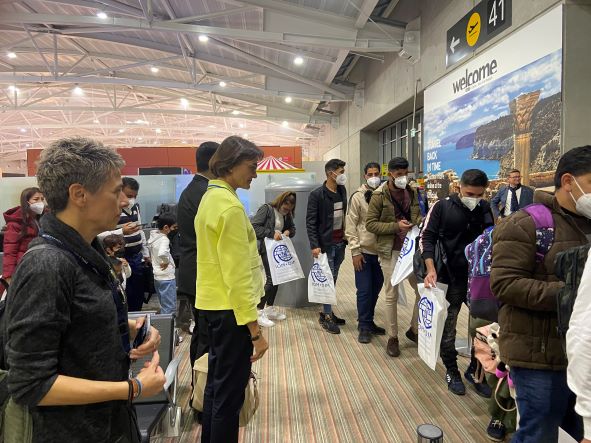
by Yiannis Ioannou
Repatriation flights from Cyprus to Germany and France began at the end of December as part of the EU's support policy for Nicosia in the refugee crisis. On this occasion, Germany's ambassador in Cyprus, Anke Schlimm, exclusively answers "K" questions about the EU's refugee crisis, its complications due to the war in Ukraine, and how a solution to the pressures that Nicosia is facing as a result of increased irregular migration flows can be found.
Thank you so much for the opportunity for an interview. To begin with, I would like your comment on the current situation regarding the refugee/migration crisis in Europe. Do you see a new 2015–2016 type of crisis given the fact that Russia is carpet-bombing Ukraine?
Russia’s war of aggression against Ukraine has caused the largest movements of refugees that Europe has witnessed since World War II. 8 million people have fled from Ukraine since the beginning of the war, and some 6 Million remain displaced within Ukraine. Of course, these high numbers of arrivals have strained the reception capacities in a number of Member States, but drawing comparisons to 2015-2016 is difficult. The activation of the EU’s so-called directive on temporary protection has been an important step, which allowed millions of refugees from Ukraine immediate, unbureaucratic access to protection status, labor markets, and social support in the EU. We have witnessed an unprecedented and overwhelming welcoming of refugees from Ukraine in many Member States of the European Union, amongst them Germany and the Republic of Cyprus. The appalling injustice and the pain of the Ukrainian people affect us all very deeply. The solidarity and support of Member States and of ordinary citizens in our countries to accommodate Ukrainian refugees is unprecedented and will continue as long as needed. The mentioned directive on temporary protection for refugees from Ukraine has also assured that the Member States’ asylum systems remain available to continue to process regular asylum cases by applicants from other countries. Russia’s strategy to strike civilian infrastructure in the midst of the winter clearly aims at triggering more refugee movements. That is why the EU and its Member States continue with substantial contingency planning to prepare for more arrivals.

Cyprus, a small, divided island, is, in the last few years, at the epicenter of irregular migration flows – quite often through Turkish-occupied areas via the buffer zone. Do you agree with the popular, in Cyprus, opinion of the weaponization of the migration/refugee issue by Turkey? What is according to your opinion the best way to deal with such a crisis?
We share the concern of Cyprus about the rising numbers of irregular arrivals of migrants. There is no doubt that Cyprus is facing a real crisis given the alarmingly high number of asylum-seekers, refugees and irregular arrivals in relation to the island’s population. While many migrants reach the island by boat over the sea, a majority are considered to have flown to the northern part of Cyprus and have crossed the “Green Line” irregularly in order to seek asylum in the Republic of Cyprus. We share the view that Cyprus is faced here with unprecedented pressure. We follow with great concern reports on an increase in irregular crossings that put asylum-seekers at risk of exploitation. We condemn any human trafficking and these criminal activities exploiting the misery of vulnerable people.
An increasing number of migrants are staying in the northern part of Cyprus and trying to make a living there. The challenge of irregular migration also affects the Turkish Cypriot side. There is no quick and “one-size fits all” solution to this challenge. I believe that access to asylum procedures in accordance with international law is of utmost importance. Indeed both sides on the island should work together and cooperate in order to address the issue of irregular migration.
The EU strongly supports the repatriation of refugees, currently stationed in Cyprus. With what tools can the EU, as well as Berlin, help the Republic of Cyprus to repatriate populations of irregular immigrants to African countries or Syria? Can this solve the problems Cyprus is facing in the last few years?
Cyprus´ efforts in dealing with a high number of refugees and migrants deserve our appreciation and call on our reinforced support. Continued support by the EU will be necessary to assist Cyprus with regard to the returns of rejected asylum seekers. Those, however, whose asylum plea results in a positive decision, who are entitled to international protection, for example, a refugee status under the Geneva Convention, may of course stay in the EU and are not expected to return. Moreover, returns should only take place to countries that cooperate with the EU’s return efforts and where a safe arrival of the returnees can be assured. Syria, for instance, does not fulfill the conditions for a safe return.
There are of course many cases where returns are mandatory, and Germany and the EU have supported Cyprus in strengthening its asylum system and improving its returns practice for several years. Since Cyprus and Germany agreed on a joint action plan on migration in December 2020, Germany has supported Cyprus for instance with the dispatch of experts and implementation of training and exchanges on returns practices. Cyprus and Germany have also conducted several joint return flights to Pakistan. The EU equally acknowledges the efforts and supports Cyprus in coping with the high arrival numbers and asylum applications and Cyprus has also participated in several EU Joint Return Operations in 2022.

In recent years, the refugee issue has become a field of confrontation within the EU, the object of multiple and serious crises, but also a field of manifestation of xenophobia, racism, Islamophobia, the rise of the extreme and populist right and a political field of hypocrisy between governments and NGOs. Do you think the time has come for the EU to collectively find a new political and social contract to deal with such an important issue?
The rise of right-wing extremism, populism, xenophobia, racism and Islamophobia are an unsettling phenomenon of our time that poses a threat to the unity and social coherence within the European Union. There are highly controversial debates in Germany – just as in Cyprus –on the issue of migration. While many consider solidarity with asylum seekers to be a “humanitarian imperative”, as the overwhelming support for Ukrainian refugees has shown, others criticize that Germany should limit its reception of asylum seekers and migrants. However, German President Walter Steinmeier has rightfully stressed, just like Pope Francis did when he visited Cyprus in December 2021, that we must never be indifferent to the plight of others. We cannot simply wish away migration. It is crucial that as Europeans we stand up against hateful narratives, insist on our values and legal principles and continue to offer our protection to those who need it.
The rise in migration numbers shows that we urgently need progress in the reform of the Common European Asylum System (CEAS). Close alignment between Germany and Cyprus is necessary to push ahead with the reform. In advancing this reform, we need to keep a balance between the responsibility of external border States to adequately care for those who arrive at their shores and the solidarity between Member States to relieve the burden on those external border states, who are most affected by high numbers of arrivals.
With a permanent solution still pending, let me take this opportunity to mention the recent success in implementing the new EU temporary solidarity mechanism which immediately helps to relieve the pressure on those external border States that by geography receive the majority of arrivals in the EU, amongst them the Republic of Cyprus. Germany has committed itself to relocating asylum seekers from heavily burdened States such as Cyprus to Germany in order to translate solidarity with Cyprus into concrete action. And the first relocations of Syrian and Afghan refugees from Cyprus to Germany have already taken place at the end of December 2022.
Finally, I can't help but ask you for your comment. President Anastasiades recently visited Berlin to bring some mobility to the resume of the Cyprus Talks. Of course, there are elections in Cyprus and Turkey in 2023. However, do you really see how the EU can help break the current stalemate in the negotiations? And if so, how?
President Anastasiades had a successful visit to Berlin end of November 2022. He was received by the President of Germany, Mr. Frank-Walter Steinmeier, and by German Chancellor Olaf Scholz. Among the topics discussed were the bilateral cooperation between our two countries and of course the current situation on the Cyprus question. Germany remains fully committed to a comprehensive settlement based on a bi-zonal, bi-communal federation with political equity between Greek and Turkish Cypriots as set out in the relevant UN Security Council resolutions. We believe that new and creative ideas for dialogue and cooperation between the two communities are needed in order to resume the peace process. The German Government and, I believe, the European Union stand ready to support any constructive engagement toward a settlement of the Cyprus issue. My Government also remains committed to supporting confidence-building measures that aim to build trust and understanding between the two communities on the island.

[This article first appeared in Kathimerini's Sunday edition and was translated from its Greek version]































